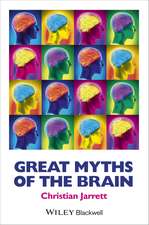The Structure of Learning: From Sign Stimuli To Sign Language
Autor R. Allen Gardner, Beatrix Gardneren Limba Engleză Hardback – iun 1998
In lively prose, describing experiments in enough depth to involve readers in the drama of experimental method, they recount the history of scientists' attempts to answer basic questions, and show how one study builds on another. Although they present the major traditional positions, they demand that readers examine actual evidence, recognize weaknesses, and consider alternatives.
This critical process leads to the delineation of a bottom up, feed forward model in contrast to the traditional top down, feed backward one. Recent research in robotics and fuzzy logic suggests ways in which artificial as well as living systems pursue bottom up, feed forward ethological solutions to practical problems. The authors' extended discussion of their exciting work teaching sign language to chimpanzees vividly illustrates the application of the basic principles of learning elucidated in the book.
Preț: 1015.26 lei
Preț vechi: 1238.12 lei
-18% Nou
Puncte Express: 1523
Preț estimativ în valută:
194.29€ • 201.69$ • 162.01£
194.29€ • 201.69$ • 162.01£
Carte tipărită la comandă
Livrare economică 22 martie-05 aprilie
Preluare comenzi: 021 569.72.76
Specificații
ISBN-13: 9780805826036
ISBN-10: 0805826033
Pagini: 390
Ilustrații: illustrations
Dimensiuni: 178 x 254 x 30 mm
Greutate: 0.88 kg
Ediția:1
Editura: Taylor & Francis
Colecția Psychology Press
Locul publicării:Oxford, United Kingdom
ISBN-10: 0805826033
Pagini: 390
Ilustrații: illustrations
Dimensiuni: 178 x 254 x 30 mm
Greutate: 0.88 kg
Ediția:1
Editura: Taylor & Francis
Colecția Psychology Press
Locul publicării:Oxford, United Kingdom
Public țintă
ProfessionalCuprins
Contents: Introduction. Classical Conditioning. Instrumental Conditioning. Mechanisms of Conditioning. Reinforcement Versus Expectancy. Sequence and Anticipation. Feed Forward Versus Feed Backward. Contiguity Versus Contingency. Appetite, Aversion, and Conflict. Excitation, Inhibition, and Competition. Reward Versus Nonreward. Places, Paths, and Bearings. Transfer. Teaching Sign Language to Chimpanzees. Concepts and Communications.
Recenzii
"The breadth, depth, and extraordinary scholarship of this work reflects the Gardners' own deep understanding of the real and significant issues in the psychology of learning. Particularly impressive ... is the presentation of learning not as a reified abstraction, but as a dynamic and ecologically-relevant activity of living organisms, themselves embedded in developmental and evolutionary histories. This is a wonderful book and it is to be hoped that it will achieve a wide circulation."
—Matthew J. Sharps
California State University, Fresno
"An outstanding text in the best tradition of scientific psychology...eminently readable--a benchmark. The Gardners lead the reader through a critical evaluation of learning theories and issues while integrating contributions from ethology and the laboratory. They challenge the reader to think carefully about evidence while pointing out how many learning theories, including the popular behavior and cognitive theories, are at logical odds with ethological findings."
—Michael C. Pullen
State University of New York, Geneseo
"The Gardners have erased the line between ethology and laboratory studies of animal learning. By employing sound operational definitions and the rule of parsimony, they present convincing evidence that animals in nature, as well as in laboratories, learn without food rewards and navigate environments without cognitive maps. They show that learning obeys a feedforward, not a feedbackward, principle and that learning takes place whether or not animals are hungry. Calling upon their years of work with Washoe and the other signing chimpanzees, they show that human language is not a uniquely human trait. The book reminds us that science eventually erases the lines we humans draw across Nature."
—Lester J. Hunt
Northern Arizona University
"A refreshing and intriguing treatment of learning and related areas--the first breath of fresh air in learning textbooks in many years. A combination of a solid approach with a well thought-out reassessment of traditional views of learning. This book was a pleasure to read."
—Harvard L. Armus
University of Toledo
"The Gardners provide a fascinating account of animal and human behavior, weaving together a century's worth of research findings from laboratory experiments, field studies, and systematic observation of animals in their natural environments."
—Larry Upton
North Carolina State University
—Matthew J. Sharps
California State University, Fresno
"An outstanding text in the best tradition of scientific psychology...eminently readable--a benchmark. The Gardners lead the reader through a critical evaluation of learning theories and issues while integrating contributions from ethology and the laboratory. They challenge the reader to think carefully about evidence while pointing out how many learning theories, including the popular behavior and cognitive theories, are at logical odds with ethological findings."
—Michael C. Pullen
State University of New York, Geneseo
"The Gardners have erased the line between ethology and laboratory studies of animal learning. By employing sound operational definitions and the rule of parsimony, they present convincing evidence that animals in nature, as well as in laboratories, learn without food rewards and navigate environments without cognitive maps. They show that learning obeys a feedforward, not a feedbackward, principle and that learning takes place whether or not animals are hungry. Calling upon their years of work with Washoe and the other signing chimpanzees, they show that human language is not a uniquely human trait. The book reminds us that science eventually erases the lines we humans draw across Nature."
—Lester J. Hunt
Northern Arizona University
"A refreshing and intriguing treatment of learning and related areas--the first breath of fresh air in learning textbooks in many years. A combination of a solid approach with a well thought-out reassessment of traditional views of learning. This book was a pleasure to read."
—Harvard L. Armus
University of Toledo
"The Gardners provide a fascinating account of animal and human behavior, weaving together a century's worth of research findings from laboratory experiments, field studies, and systematic observation of animals in their natural environments."
—Larry Upton
North Carolina State University
Notă biografică
R. Allen Gardner, Beatrix Gardner
Descriere
Integrating basic principles of ethology and the psychology of learning, this book offers students an engaging and conceptually coherent intro. to what we know about how living organisms profit from experience and adapt to their environments.

















